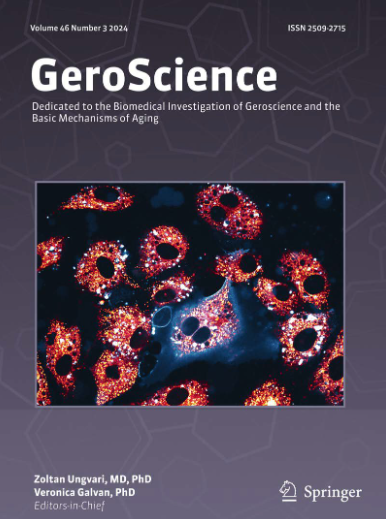轻度认知障碍影响有或无多发性硬化症的老年人脑功能连通性与认知的关联。
IF 5.4
2区 医学
Q1 GERIATRICS & GERONTOLOGY
引用次数: 0
摘要
认知能力下降在多发性硬化症(MS)中很常见,尽管神经机制尚不完全清楚。目的是研究轻度认知障碍(MCI)对老年多发性硬化症(OAMS)和年龄匹配的健康对照者静息状态功能连接(RSFC)和认知功能之间关系的影响。参与者接受了核磁共振成像(MRI)扫描和认知评估。口腔符号数字模式测试(SDMT)是结果测量。多元线性回归检验了RSFC网络与SDMT绩效之间的关系,并在群体特定分析中进行了分析。以MCI作为调节因子,重复这些分析。调整后的分析显示,较好的SDMT表现与感觉运动网络(p = 0.01)、左额顶叶网络(p = 0.027)和显著性网络(p = 0.047)较高的RSFC显著相关。分层分析显示,OAMS组在内侧视觉网络(p = 0.007)和感觉运动网络(p = 0.018)上有显著的正相关。在OAMS中,MCI调节了后默认模式(p = 0.016)和皮层下网络(p = 0.042)中RSFC和SDMT表现之间的关联,而对照组没有显著的调节作用。大脑网络中较高的RSFC与衰老过程中更好的认知相关,但这种关系在MS和MCI存在时被改变。本文章由计算机程序翻译,如有差异,请以英文原文为准。
Mild cognitive impairment impacts association of functional brain connectivity with cognition in older adults with and without multiple sclerosis.
Cognitive decline is common in multiple sclerosis (MS), although neural mechanisms are not fully understood. The objective was to investigate the impact of mild cognitive impairment (MCI) on the relationship between resting state functional connectivity (RSFC) and cognitive function in older adults with multiple sclerosis (OAMS) and age matched healthy controls. Participants underwent magnetic resonance imaging (MRI) scans and cognitive assessments. The Oral Symbol Digit Modalities Test (SDMT) was the outcome measure. Multiple linear regressions examined the relationship between RSFC networks and SDMT performance across the cohort and within group-specific analyses. These analyses were repeated with MCI as a moderator. Adjusted analyses showed that better SDMT performance correlated significantly with higher RSFC in sensorimotor (p = 0.01), left frontoparietal (p = 0.027), and salience (p = 0.047) networks. Stratified analyses showed significant positive associations for the OAMS group in medial visual (p = 0.007) and sensorimotor (p = 0.018) networks. Among OAMS, MCI moderated the association between RSFC and SDMT performance in the posterior default mode (p = 0.016) and subcortical (p = 0.042) networks, while no significant moderation effects were observed for the control group. Higher RSFC in brain networks correlates with better cognition in aging, but this relationship is modified in the presence of MS and MCI.
求助全文
通过发布文献求助,成功后即可免费获取论文全文。
去求助
来源期刊

GeroScience
Medicine-Complementary and Alternative Medicine
CiteScore
10.50
自引率
5.40%
发文量
182
期刊介绍:
GeroScience is a bi-monthly, international, peer-reviewed journal that publishes articles related to research in the biology of aging and research on biomedical applications that impact aging. The scope of articles to be considered include evolutionary biology, biophysics, genetics, genomics, proteomics, molecular biology, cell biology, biochemistry, endocrinology, immunology, physiology, pharmacology, neuroscience, and psychology.
 求助内容:
求助内容: 应助结果提醒方式:
应助结果提醒方式:


